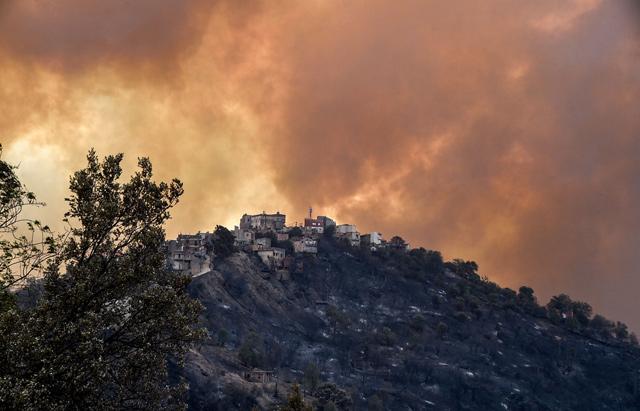- International News
- Thu-2021-08-12 | 05:40 pm

Nayrouz News Agency :
Firefighters, troops and civilian volunteers battled blazes in forests across northern Algeria on Wednesday as the country reeled at a death toll of at least 65 people in the latest Mediterranean wildfires.
Algeria's President Abdelmadjid Tebboune declared three days of national mourning starting from Thursday, and authorities say they suspect widespread arson after so many fires erupted in such a short space of time.
Twenty-eight of those killed were soldiers deployed to help overstretched emergency services tackle the rash of more than 50 fires that broke out on Tuesday, state television reported.
Several arrests have been announced, but the identity or suspected motives of those detained have not been disclosed.
Images of trapped villagers, terrified livestock and forested hillsides reduced to blackened stumps were shared on social media, many of them accompanied by pleas for help.
AFP journalists saw villagers desperately trying to put out the spreading fires with makeshift brooms in an effort to save their homes.
High winds fuelled the rapid spread of the fires in the tinder-dry conditions created by a heatwave across North Africa and the wider Mediterranean, fire official Youcef Ould Mohamed told the state-run APS news agency.
Scores of separate wildfires remained active Wednesday, spread across 17 provinces, emergency services spokesman Nassim Barnaoui told reporters.
Most of the fires and 16 of the deaths were recorded in Tizi Ouzou district, in the mainly Berber region of Kabylie, east of the capital Algiers.
"I left all my stock in my village and fled to Tizi Ouzou with my wife and three children,” said Abdelhamid Boudraren, a shopkeeper from the village of Beni Yeni.
"Luckily I own a flat in the centre of Tizi Ouzou, where I’m holed up with my family and some neighbours.”
The situation was also "alarming” in Bejaia, Tarch Hakim, the head of civil protection in the city, the second biggest in Kabylie, told APS.
"Things were under control, but with the outbreak of nine large fires on Wednesday morning, our forces are scattered,” Hakim said.
Fires in Tunisia
There have been mounting calls for aid convoys to be sent to the worst-hit districts with food and medicine from the capital.
On Wednesday, an AFP correspondent saw several lorries headed to Tizi Ouzou with aid donated by the public.
France’s Foreign Minister Jean-Yves Le Drian said the former colonial power "stands ready” to offer support in tackling the situation, and expressed the "solidarity of France with the Algerian people”, in a post on Twitter.
The British embassy in Algiers offered their "condolences to those who have died, or been injured or affected”.
State media have reported four arrests for suspected arson.
Meteorologists expect the heat wave across North Africa to continue until the end of the week, with temperatures in Algeria reaching 46ºC.
In Algeria’s neighbour Tunisia, the temperature in the capital Tunis hit an all-time record of 49ºC on Tuesday.
The Tunisian emergency services reported 15 fires across the north and northwest, but no casualties.
On the northern shores of the Mediterranean, Turkey reported eight deaths and Greece three from wildfires that have raged for the past two weeks.
Each summer, Algeria endures seasonal wildfires, but rarely anything approaching this year’s toll.
In 2020, nearly 440 square kilometres of forest were destroyed by fire, and several people were arrested on suspicion of arson.
On Monday, the UN released a major report showing how the threat from global warming is even more acute than previously thought.
It highlighted how scientists are quantifying the extent to which human-induced warming increases the intensity and/or likelihood of a specific extreme weather event, such as a heatwave or a wildfire.
Climate change amplifies droughts, creating ideal conditions for wildfires to spread out of control and inflict unprecedented material and environmental damage.













